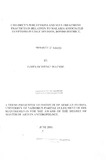| dc.description.abstract | This study explores self-treatment practices among children in relation to malaria
associated symptoms in Usigu Division, Bondo District.
Cultural Ecology theory which views people's health-seeking behaviour during illness
episode as a cultural interaction with their natural environment guided the study, It argues
that people adjust to their natural environment by means of their culture, The ecological
approach also views distribution of disease in broad dimensions including; how factors or
biology, culture and environmental pressure as well as 'the economic status of tile
individuals influence distribution ofdiseuse. People arc seen as utilizing culture through
the generations as a tool for adapting to and controlling their environment
Data were collected through both quantitative and qualitative techniques, which included
semi-structured surveys, focus group discussion and case histories. Data collected
through surveys were coded and fed into computer for analysis using the SPSS computer
package while qualitative data were summarized and analyzed qualitatively, some of it
presented verbatim, that is, presented in the Iorm in which it was offered by the
respondents. A total of203 children provided data for the study. or these, 139 responded
to the individual semi-structured questionnaire while the remaining 64 participated in the
focus group discussions. Twenty mothers of the study children were also involved in the
study to provide case histories of previous illness 'episodes of their children and what they
did in response to illness.
The results show that malaria is a common everyday illness whose treatment during an
episode depends on the family presumptive diagnosis at home and home treatment is the
lirst remedy that people resort to. Other therapeutic choices arc made as illncsx
progresses with more interpretation and reinterpretation or illness symptornx to explain
the cause.
Results of the study further indicate that individual perception of illness and the
subsequent treatment practices as well as their knowledge of prevention of disease
influence malaria control in the study area. I\. striking finding or the study was that selfmedication
among school children is prevalent despite the fact that medicines education
is not included in the school curriculum.
It is recommended that efforts need to be put on health education geared towards rational
use of drugs to help in reducing and controlling the prevalence of malaria in the study
area. | en |

